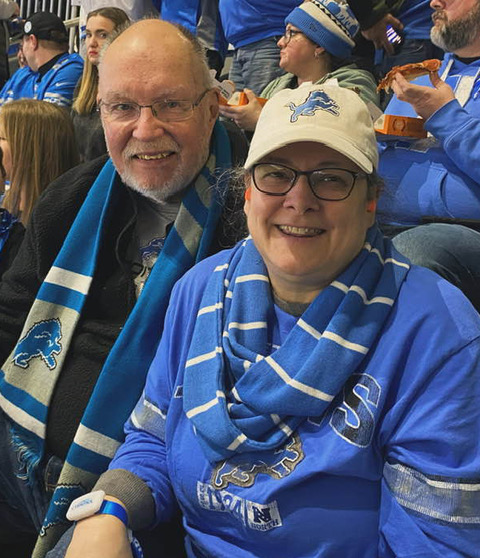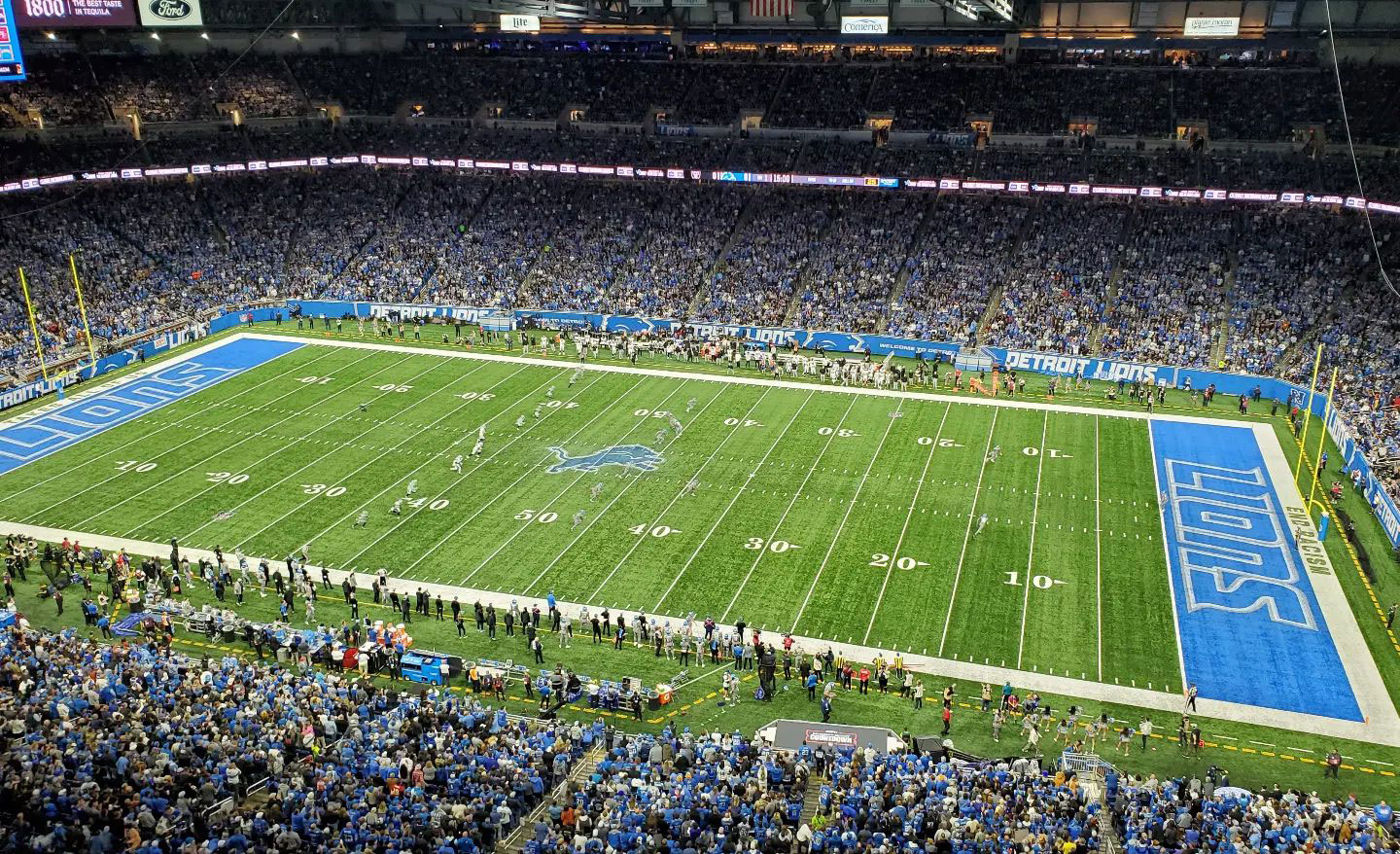When the Detroit Lions beat Matthew Stafford and the Los Angeles Rams 24–23 in the NFC Wild Card game on Jan. 24, Hope College’s Anne Bakker ’85 and Tom Davelaar ’72 were in their seats — Section 225, in the corner of the end zone — and they could hardly believe they’d won.
“We were both afraid they were going to lose that game,” Bakker said. “Nobody in the crowd knew quite what to do; we were all waiting for a flag to get thrown or something.”
“There were many years that we hoped something like this could happen, but we weren’t sure it ever would. Now to see it come to fruition the past two weeks has been a special thing,” said Davelaar, an assistant men’s basketball coach at Hope.

Davelaar has been a Lions season ticket holder since 2002, when Ford Field opened, and has been attending Lions games with Bakker since they married in 2012. Bakker is travel coordinator at Hope.
The Lions’ historic run has been a dream come true for both of them. The Lions, who this season claimed their first playoff wins since 1992, will face the San Francisco 49ers on Sunday, Jan. 28, for the chance to win their first conference championship since 1957. A win would earn them a spot in the Super Bowl for the first time in franchise history.
“It’s been a fun ride,” said Dr. Jayson Dibble, professor of communication at Hope. “I’m a fan of the game, and I’m happy for those fans who are finally getting to see their team succeed.”
Dibble is a Lions fan who loves the game: He officiates college football at the Division II level as well as local high school games. He’s quick to point out, though, that he doesn’t let his identity or self-esteem get wrapped up in the Lions’ success, as some of the more dedicated fans might.
From an academic perspective, he explains this phenomenon — how fans can get attached to players, coaches, even entire teams — through something called “parasocial relationships.”
“The idea of parasocial relationships suggests that our minds process these relationships very similarly to how they process our real-life relationships,” Dibble said. “The potential to form parasocial relationships can really set the stage for some of the fandom you see.
“Fans can go through parasocial heartache, parasocial breakup, unrequited or unfulfilled ‘love,’ and so on. So when Lions fans are finally feeling some fulfillment, it’s the same in the mind as when a long lost love finally emerges from the wilderness and returns to us.”
Dr. Chad Carlson ’03, professor of kinesiology, conducts research focused on the socio-cultural aspects of sport. He explains some of the elements of fandom by pointing to shared human longing for community:
“We’re all interested in being part of a community of some sort or another,” he told me. “COVID tested that for us, but we’ve come out with a renewed interest in being part of a community, and sport offers us that opportunity, even if it is wholly virtual or spectatorial.”
Remember, though, that however imagined the community might be, the parasocial relationships mimic the feelings that come from real, social relationships. The feelings, in other words, are real. And this is true even when the community in question (in this case, of Lions fans) faces repeated losses, year after year.
“It’s easy to be part of a community that wins regularly. But there are also badges of honor or valor for those who are part of communities of teams that lose regularly,” Carlson said. He likened this to the leadup to the Chicago Cubs’ 2016 World Series win. “There’s something honorable about being part of a community that supports a team that never wins the big one. I think that’s part of what attracts people to the Lions this season — it’s a team that’s on the upswing, for sure, but it’s a team that has never won the big one.”
For a fan base that has endured long years of disappointment, this year’s championship run brings an unfamiliar feeling: not of hope, exactly, but of hopes fulfilled.
“As a long-time coach here at Hope, we always say this to our players, our staff, our recruits: There’s always hope,” said Davelaar. “For many years, there was always hope for the Lions — and now to see that being realized, at least in part, is a wonderful thing, a blessing.”
Carlson picked up on the theme of hope, too, turning the conversation toward a Christian perspective: “There might not be any better laboratory in the human experience than sport for us to understand the theological virtues of redemption and hope.
“When we lose, we know there’s always an opportunity for redemption. Redemption through Jesus Christ on the cross is never not offered to us as Christians. That is always part of the Christian’s story,” Carlson said. “If the Lions fall short, there’s always the next opportunity. So there’s something there that helps us to understand the theology of the Christian faith.
“Hope would be something similar, too,” Carlson continued. “There’s hope that springs eternal in sport. There’s always the next time, and we always step into it hoping — not knowing for sure what the outcome will be. Especially as spectators, we have no agency in this, so what we hope for is going to be done by somebody else, and there’s something theologically interesting in that: God and Jesus Christ have already done the work for the Christian.”
It’s that constant, recurring hope — even hope against impossible odds — that gave Dibble his metaphor for the Lions’ repeated quest to achieve postseason success: Charlie Brown trying to kick the football.
“Think of all the people who resonate with Lucy and Charlie Brown, when Lucy continually pulls the football away,” he said. “You know there’s absolutely no way Charles Schulz was going to draw Charlie Brown kicking the football — but your hope is still there.”
Lions fans have been hoping for the past 30 years. “And now they’re defying that expectation,” Dibble said. “Now Charles Schulz is finally drawing Charlie Brown kicking the football, and we’ve never seen that before. What does that look like?”
Bakker and Davelaar know what it looks like: It looks like watching two playoff wins at Ford Field with more than 66,000 other members of the long-suffering Lions community.
Looking ahead to the Lions’ game against the 49ers on Sunday, I asked Bakker and Davelaar if they thought Charlie Brown was finally going to get the football.
They both agreed: “He already has.”
Photo of Ford Field by Dave Hogg, license CC BY 2.0.


